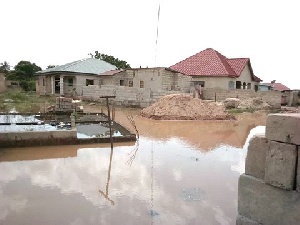 Victims are yet to receive relief items from government.
Victims are yet to receive relief items from government.
Reports reaching Today indicate that one person has died, while 1,159 others, including 43 pregnant women, have been displaced by floods in Tetegu, a fishing community in the Weija-Gbawe Municipality of the Greater Accra Region.
The unfortunate situation, Today gathered, follows a recent spillage of the dam by the Ghana Water Company Limited (GWCL), which was compounded by continuous rains, leading to flooding and loss of life and other valuable properties.
Also, a total of 906 of livestock were also missing, while dossiers of building structures collapsed in the process.
One of the residents of Tetegu, named Ken Gbormitah, who died as a result of the flood, was buried on Saturday, October 27, 2018. The floods, which lasted for about two days, Today understands, worsened following the spillage of water from the Weija Dam.
But, Today discovered that the victims were yet to receive relief items from the government.
The annual spillage carried out by the Ghana Water Company Limited is meant to release excess water from the dam.
The maximum level of water the dam is built to hold is about 46 feet, but the level came up to 48 feet, thereby threatening its safety hence the decision to spill.
Although their homes are flooded up to the knee-level, residents of Tetegu told Today that they have nowhere to go.
Meanwhile, a visit by Today to the area on Sunday, October 27, 2018, saw the Tetegu Residents Committee Chairman, Mr Atukpa Mawuengya, blaming the situation on the inability of the GWCL to dredge the estuary (where the River Densu and the sea meet at Tsokome) before the spillage of the water from the Weija dam.
According to him, the residents living in Fannah fishing community in Accra have taken a decision to use the sand filled with sacks to block the water which passes through the drains from Tetegu through to the estuary at Tsokome, making it difficult for the flood water to run to the sea.
He stated that the annual spillage of the Weija dam could be normalised if the authorities of GWCL relocate the residents of Fannah and also take technical and administrative measures to make drainage of the estuary a permanent thing.
He also stressed the need for government to come to their aid, indicating that the floods were destroying people’s livelihoods.
According to him, anytime the Weija Dam is re-opened, the whole Tetegu and its surroundings get flooded which recently claimed the life of a resident destroyed many valuable properties.
Mr Mawuengya told Today that there have been several efforts by the opinion leaders of Tetegu to tackle the issue concerning the opening of the dam to stop flooding but all to no avail.
He, therefore, appealed to the central government must come to their aid by constructing a good drainage system to prevent the perennial problem.
Meanwhile, the Communications Manager of GWCL, Mr Stanley Martey, has told Today that there was nothing the company could do for the residents living downstream since the safety of the dam was paramount.
“The dam is man-made and it can break at anytime. And if that dam is to collapse now, it will wipe all those [communities close to the dam] within seconds and Greater Accra will be without water for close to five years,” he said.
The Weija Dam sits on the Densu River and is the main water treatment plant for the Greater Accra Region.
Operated by the GWCL, the dam supplies about 80 per cent of the potable water for the city and its environs. Every year, with the onset of the rains, the GWCL spills water from the dam to prevent damage to the facility.